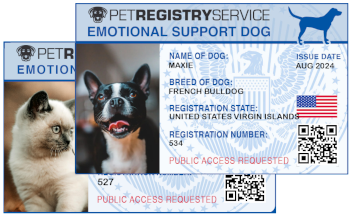Emotional Support Animals: Companions for Mental and Emotional Well-being

Emotional Support Animals (ESAs) provide comfort and companionship to individuals struggling with mental health challenges, such as anxiety, depression, or post-traumatic stress disorder (PTSD). Unlike service animals, ESAs are not trained to perform specific tasks but play a vital role in improving their owner’s emotional well-being. Here’s a closer look at what ESAs are, their benefits, and the rules and responsibilities involved in owning one.
What is an Emotional Support Animal?
An Emotional Support Animal is a pet that provides emotional comfort to its owner. They can be of any species, though dogs and cats are the most common. ESAs differ from service animals in that they:
- Do not require specialized training: ESAs offer companionship rather than perform specific tasks.
- Are protected under certain laws: ESAs have legal rights in housing and, in some cases, air travel.
Benefits of Emotional Support Animals
For individuals coping with mental health conditions, an ESA can offer the following advantages:
1. Reduced Anxiety and Stress
The calming presence of an ESA can help regulate emotions during stressful situations, such as social interactions or overwhelming environments.
2. Improved Mood
The companionship of a beloved pet can increase levels of serotonin and dopamine, often referred to as “feel-good” chemicals.
3. Increased Social Interaction
Walking a dog or engaging in activities with your ESA can lead to more opportunities for socialization, combating feelings of isolation.
4. Routine and Responsibility
Caring for an ESA encourages a daily routine, providing structure and a sense of purpose.
5. Grounding Effects
Pets, especially dogs and cats, can help individuals stay present and grounded, reducing the impact of anxiety and intrusive thoughts.
Legal Protections for ESAs
Fair Housing Act (FHA)
Under the FHA, landlords must make reasonable accommodations for individuals with ESAs, even in properties with a “no pets” policy. Owners must provide a letter from a licensed mental health professional to verify their need for an ESA.
Air Carrier Access Act (ACAA)
While the ACAA previously allowed ESAs to travel in airplane cabins, regulations have changed. Most airlines now classify ESAs as pets rather than service animals, meaning owners must adhere to pet travel policies.
How to Qualify for an ESA
To have an ESA, you must have a diagnosed mental health condition that benefits from the animal’s companionship. The process includes:
- Consulting a Licensed Mental Health Professional: Obtain a legitimate ESA letter stating your need for the animal.
- Choosing the Right Animal: Select a pet that aligns with your lifestyle and needs.
- Registering Your ESA (Optional): While not legally required, registering your ESA and obtaining an ID card or vest can help communicate their role to others.
Responsibilities of ESA Owners
Owning an ESA comes with responsibilities to ensure the well-being of both the animal and those around you:
- Proper Care: ESAs require adequate food, exercise, and veterinary care.
- Good Behavior: ESAs should be well-mannered and non-aggressive in public settings.
- Respect for Others: Understand that not everyone is comfortable around animals and act accordingly.
Common Misconceptions About ESAs
- “Any pet can be an ESA.” While any animal can provide emotional support, an ESA requires a valid recommendation from a licensed mental health professional.
- “ESAs have the same rights as service animals.” ESAs do not have access to all public spaces like service animals.
- “Registering an ESA is mandatory.” Registration is optional and not legally required.
Conclusion
Emotional Support Animals play an invaluable role in the lives of those who need them, offering unconditional love and companionship that can significantly enhance emotional well-being. If you or someone you know could benefit from an ESA, consult a mental health professional to explore this supportive option.




